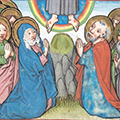Carmelite homily for Friday, July 3, 2020, the Feast of Saint Thomas the Apostle – Lectionary 593 (John 20:24-29)
On the day that Saint Therese of Lisieux professed her vows in Carmel, she had written a prayer and put it in her pocket. And part of the prayer says, “Jesus, I ask you for nothing but peace, and love, infinite love; love which is no longer ‘I’ but ‘You.” This is my interpretation of this Feast of Saint Thomas the Apostle. Because we have Thomas who returns to the Upper Room after Jesus has left and he says, ‘I will not believe; I need to put my hands in the nail marks; I need to put my hand in his side.’ It’s all I, I, I. So the next time Jesus appears and Thomas does that he says, ‘My Lord and my God.’ What happened to all the I? I think that’s what Jesus does – he pulls us out of the I, the me, the selfishness – to the you, which is neighbor, which is God, which is those in need, the poor. That’s the call, the invitation, of today’s Gospel and this Feast: to not live in the I but in the you.




